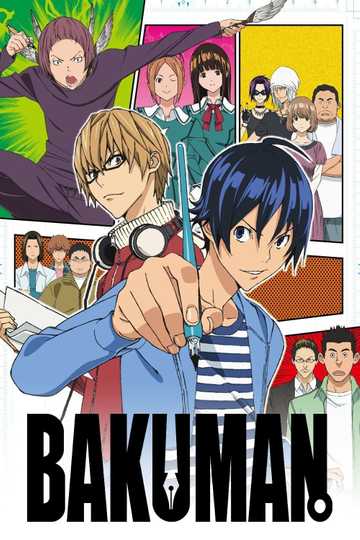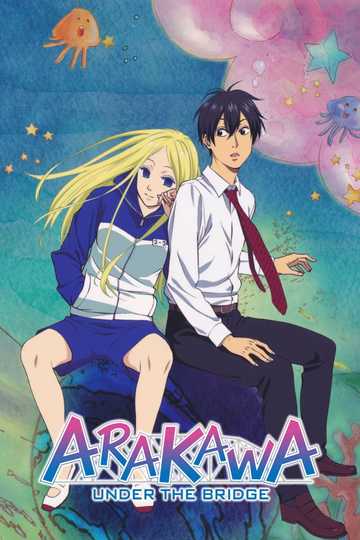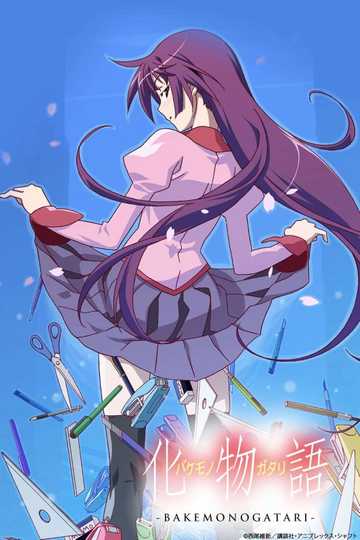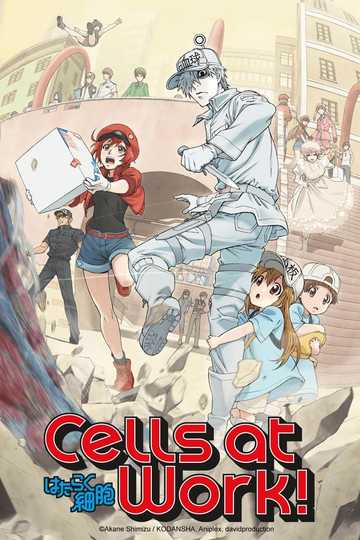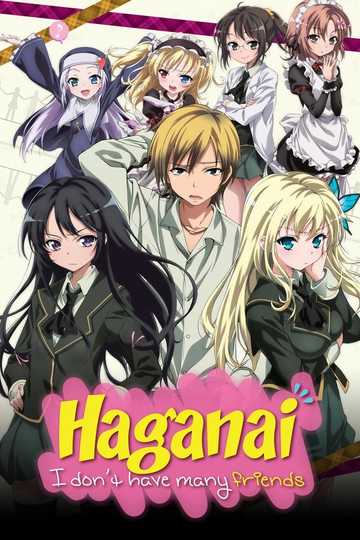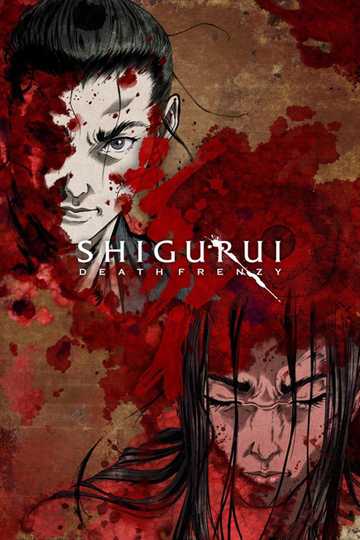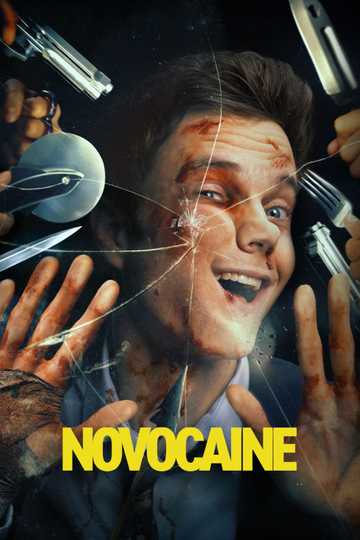Season 1 Episodes
1. Dreams and Reality
Moritaka Mashiro, an average student with a talent for drawing, forgets his notebook at school, where his classmate Akito Takagi finds and looks through it. Takagi likes his drawings and asks Mashiro to team up with him to create a best-selling manga. Mashiro refuses because his uncle was a manga artist until he died from overworking, while deeply in debt, which derails his dream. Takagi soon invites him to visit Miho Azuki, the girl Mashiro has an unrequited crush on, and Takagi tells her of his plan to create a manga that will become an anime, in which she will play the heroine. Mashiro also proposes to marry Azuki when both their dreams come true, and she agrees that they will, but shall not see each other until then. With this motivation, Mashiro decides to become a manga artist.
2. Dumb and Smart
Mashiro chats with Takagi, who tells him that he chose Mashiro because he is smarter than many of his peers in matters outside of scholarship, and that he believes Azuki has a similar kind of intelligence, with the ability to be appealing to others. Mashiro tells Takagi that he believes his uncle committed suicide, and thus suspects that his parents will oppose him becoming a manga artist. Mashiro's mother says his uncle did not commit suicide, but still opposes his decision until his father and grandfather show support for his dream. Mashiro's grandfather gives him his deceased uncle's studio apartment, and Mashiro brings Takagi to see it.
3. Parent and Child
Mashiro and Takagi arrive at Mashiro's uncle's apartment, where they look around and Mashiro shows Takagi the manuscripts and storyboards, that the author of a manga series produces before drawing it. Mashiro realizes that his uncle was working extremely hard until his death and vows to approach it with the same resolve. Mashiro and Takagi find letters between his uncle and his friend from childhood, which stop before his hit manga was serialized, and looking at a yearbook photo of her, realize that he had been in love with Azuki's mother. They go to visit Azuki's mother the next day, and learn that she was also in love with him, but never could admit it and fell in love with someone else. Mashiro asks Azuki's mother not to tell her about the relationship between her and his uncle, and he then sets out to make a manga.
4. Time and Keys
Mashiro shows Takagi all that he has drawn and points out all the mistakes he has made, as well as the finer points of using tools for drawing manga. When Takagi questions him, Mashiro tells him about G-Pens and Kabura pens, making manuscripts, and Taro Kawaguchi's three rules to a successful manga: conceit, doing your best, and luck. When they go to a convenience store, Takagi notices that the latest issue of Jack has a semi-finalist named Eiji Nizuma, a fifteen year old manga creator. The two discuss their high schools, manga, and editors, thus coming to the conclusion that they would finish the manuscript for a manga by summer's end and show it to an editor of Jack. While walking home with Takagi, Mashiro encounters Azuki by chance; while the two are unable to look at each other as they pass, they both turn back to look.
5. Summer and Names
Recalling when he and Azuki turned back to look at each other at the same time, Mashiro tells Takagi that he and Azuki have been on the same frequency for years, indicating that they are connected without having to say anything about it. Azuki's best friend Kaya Miyoshi goes to Takagi to complain about him telling Azuki about her dream, and as she does so, gives indications of romantic interest in Takagi that Mashiro and Miyoshi notice. During the summer, Mashiro and Takagi stay at Mashiro's uncle's office, and work on a manga called The Two Earths. When it is complete, they call the Shonen Jack editorial department.
6. Carrot and Stick
Mashiro and Takagi meet with Akira Hattori, one of the editors at Shonen Jack. He notes that their work has flaws, as it is too text-driven and not drawn in manga style, but they have potential. He tells them that they are better suited to figuring out what could be a hit and drawing that, rather than drawing what they want, and while they are less likely to get a smash hit with that skillset, they are more likely to follow up on one if they do. Hattori gives them his contact information, encouraging them to come to him with their work. At school, the teacher decides to seat boys and girls next to each other, resulting in Mashiro sitting next to Azuki.
7. Tears and Tears
After meeting with Hattori, Mashiro and Takagi continue working on new submissions, and Mashiro writes notes to Azuki in class. Azuki cries after Mashiro asks her if they have to wait to be together until they have fulfilled their dreams, and she gives him her email. Mashiro is anxious to submit a work for the Tezuka Award so that Azuki can smile again, but Takagi suggests that they should proceed more cautiously and make their manga as good as it can be. Hattori calls them, and tells them that the work they submitted did not even make it to the finalists, but Takagi and Mashiro resolve to keep trying and go for the next Tezuka award, much to Hattori's pleasure. Nizuma receives a visit from his editor and the editor in chief, and agrees to move to Tokyo to write his manga if he gets the right to cancel one series after becoming the top-ranked manga artist.
8. Uncertainties and Expectations
Takagi comes up with some more ideas, including One Hundred Millionth, a story about people being ranked according to their abilities, and Hattori is impressed with the story, causing Mashiro to wonder if his art is good enough. The story is chosen as one of the finalists, but does not make it to the four chosen for the award or honorable mentions. Shortly afterward, Ishizawa, a classmate, claims that Mashiro's art is holding Takagi down. Takagi gets angry and punches Ishizawa.
9. Regrets and Understandings
Takagi is suspended for a week after punching Ishizawa, causing Mashiro to worry about him. He goes over to visit Takagi and learns that the story ideas he submitted to him were only a few of the ones he came up with. Mashiro then learns that Miyoshi and Aiko Iwase, the second best student in his grade, both have feelings for Takagi. Takagi tells them that he likes them both, but cannot be in a relationship with either due to his manga career. Iwase tells him to quit writing manga and leaves, while Miyoshi promises to support him. Miyoshi gets angry after Takagi admits that he only spoke to her to get information about Azuki for Mashiro, and Mashiro leaves with his determination restored.
10. 10 and 2
Mashiro and Takagi meet with Hattori, who says the manga artists liked their work, but the editors judging it thought it would never be published. Mashiro, wanting to progress faster than he is now, wonders if he could submit a work for serialization, and Hattori is doubtful. The editor in chief says that work needs to be good to be serialized, but Mashiro and Takagi are not good enough yet, and need a good main character to do so. Their early attempts are unimpressive, but Hattori suggests that a cult hit that only 20 percent of the reader base would read, but consider their favorite, might be a way for Mashiro and Takagi to get first place. Takagi mentions an idea he has called Money and Intelligence, in which people sell the contents of their minds to others, and Hattori suggests that they work on it.
11. Chocolate and NEXT!
Mashiro and Takagi work on Money and Intelligence while applying to the relatively easy North High School. Miyoshi questions why Mashiro and Azuki are not seeing each other, and Takagi concludes that Azuki wants to remain focused on her dream. Mashiro and Takagi get accepted into North High School along with Miyoshi and learn that their work will run in the seasonal magazine NEXT. Hattori tells them that the editors are planning to use them to make Nizuma look good by comparison, but he tells them this is their chance to impress them and win against Nizuma.
12. Feast And Graduation
After celebrating by eating out, Hattori, Takagi and Mashiro discuss Money and Intelligence, and what changes they need to make to it. Hattori says that they should wait until graduating from high school to go for serialization, and that even Nizuma is going for it too early. Miyoshi tells Takagi that Azuki is moving and hopes that she will see Mashiro at least once before she does. Mashiro insists on keeping to their promise despite not knowing how long it will take until he is able to fulfill it, but meets with Azuki on the way home from the graduation ceremony. He asks how long she will wait, and she promises to wait forever, pleasing him.
13. Early Results and the Real Deal
Mashiro, at Miyoshi's suggestion, sends an email to Azuki to begin correspondence with her. During the first day of high school, Mashiro and Takagi submit their new pseudonym, "Muto Ashirogi". Hattori is impressed with their work, but Mashiro notices that he is not expecting Money and Intelligence to be serialized, wondering if it is because of his desire that they wait until after high school to get serialized. Money And Intelligence gets first place in the early results of the NEXT polls, but drops to third place in the actual results, with Nizuma's work getting half the votes. This development convinces Mashiro and Takagi that they must make a mainstream work to go for first place, and resolve to make one better than their previous efforts.
14. Battles and Copying
Mashiro has come to the conclusion that doing mainstream battle manga is the way forward, and draws characters from other battle manga to polish his skills at drawing this type of manga, Meanwhile Nizuma's manga "Yellow Hit" is on the verge of being serialized, but Nizuma's editor learns that he is planning on submitting "Crow" instead, and brings him down to the editorial offices. At the same time, Mashiro and Takagi are meeting with Hattori, who tells them that they are not suited to mainstream manga and that the mainstream authors who are popular are considerably more talented. Nizuma meets Mashiro and Takagi, telling them that he liked Money And Intelligence and wants to be friends with them, before drawing a name in front of them. Hattori hopes that demonstration will convince them that they're not able to compete with him in mainstream manga, but they remain determined to do so, and he gives them six months to submit a good mainstream work before he steps down as their editor.
15. Debut and Hectic
Hattori goes over the weaknesses of Mashiro and Takagi's storyboard, and tells them that they need good characters, simple yet exciting battles, cute heroines, and tragedy and humor to make a good storyboard. Nizuma admits that he wrote the name on the spot, rather than having it in his head, and Mashiro and Takagi realize that he is a "genius" who can draw what he wants. Nizuma tells his editor that he likes the passion in Mashiro and Takagi's eyes, and sees them as his rivals. Meanwhile, Azuki auditions for Saint Visual Girls' Academy, a midnight anime, and gets a bit part. Mashiro, seeing her progressing toward her dream, becomes somewhat impatient and asks her to continue waiting for him, and she promises to do so while telling him to stop sending emails like that.
16. Wall and Kiss
Mashiro and Takagi, incorporating Hattori's suggestions, comes up with a concept for a story about an angel fighting other angels who kill humans to advance themselves, but are frustrated at their lack of progress. The name is rejected, but the feedback notes that they have promise. Around this time, Takagi is struggling to think of another idea, and begins seeing Miyoshi more often, prompting Mashiro to wonder if he is working on it at all. Hattori learns that Nizuma needs an assistant and that Takagi would not stop Mashiro from going to work for him. Mashiro hears of the offer, and is hesitant to accept it until he happens upon Takagi kissing Miyoshi.
17. Braggart and Kindness
Mashiro starts work as an assistant for Nizuma, and meets the other two assistants; Shinta Fukuda, who had placed lower than he did in NEXT, and Takurō Nakai, who won an award 10 years ago, but has been unable to accomplish anything noteworthy since then. Despite Fukuda and Nizuma questioning why he is working as an assistant instead of trying to get published, Mashiro is determined to learn what he can to help Takagi. Fukuda realizes that "Crow" will eventually get canceled after the novelty wears off if Nizuma does not make it more substantial and interesting. Nizuma adjusts the story accordingly, while also deciding to meet with his editor.
18. Jealousy and Love
While reworking Chapter 5, Fukuda reveals that he is dissatisfied with many aspects of Jack, particularly how series are ordered by their popularity, but Yujiro tells him to get serialized before he talks about changing Jack. Nizuma tells Mashiro that he has been drawing since he was young, when his family had no money for video games, and Mashiro remembers how he also was drawing all the time before his uncle died. Mashiro, remembering his passion for manga, resigns as Nizuma's assistant and goes home, where he looks through his old manga, and decides to write a mystery next. Meanwhile, Takagi is writing cell phone novels for Miyoshi to publish, causing Mashiro to wonder if he is working on the name at all. Mashiro notices the contrast between Takagi's relationship with Miyoshi and his own relationship with Azuki, and wondering if the distance between them is increasing, asks why she is willing to accept not seeing him.
19. Two and One
Summer ends without Mashiro hearing back from Takagi, and Takagi returns the key to Mashiro's uncle's apartment, apologizing for failing to come up with a name in time but resolving to become a manga writer. Mashiro meets with Hattori, who is impressed with his idea of a detective who cons criminals into exposing themselves, but doubts he can succeed without Takagi's help. Hattori learns that Takagi is also intending to make a mystery, but does not reveal Mashiro's story to him until another editor asks Mashiro to illustrate a runner-up for Story King. Hattori then plans for Mashiro and Takagi to work on their detective story for two years before it gets serialized, without having either tell the other. Mashiro struggles to write a name on his own, but Takagi approaches him and shows him five names, one of which is a detective story. Mashiro and Takagi decide to work together again, and to work on their detective story for the next six months.
20. Cooperation and Conditions
Mashiro and Takagi discuss how to improve the concept behind the story, now known as Detective Trap, and Takagi begins looking over many detective stories that Hattori sent him. The two meet with Hattori, insisting on proceeding with Detective Trap while still in high school, and Hattori tells them that in order to get serialized, Detective Trap must do well in the Golden Cup, and they must bring him a 19-page story every two weeks to show that they can do so every week with assistants. They succeed in keeping up in spite of the difficulty involved in doing so, and are officially entered into the contest.
21. Literature and Music
Mashiro and Takagi continue submitting a story every two weeks, with Mashiro sacrificing sleep to do so, but they have several weeks to go. They see Nakai with Ko Aoki, the runner-up of the Story King competition. Nakai reveals that he's entering- with her, and that Fukuda's entry is expected to place first. Hattori reveals that Muto Ashirogi's work has gotten into the Golden Future Cup, and while the rank influences how it will fare, so will the number of people who voted that they liked it. One of their rivals is Koji "Koogy" Makaino, a popular musician who wishes to become a mangaka, and Fukuda believes that his fans will give him an unfair advantage in the questionnaires. Fukuda, Nakai, Mashiro and Takagi then go to the editorial offices to protest this.
22. Solidarity and Breakdown
Team Fukuda reaches the editorial offices, but despite their protests, the editors do not believe Koogy's advantage is unfair or his tactics are unethical, and Mashiro decides to defeat him by making a better manga. Fukuda then proposes that the authors check each other's names, and they are surprised by each other's level of skill. Midway through the session, Aoki refuses to continue to participate, saying that her manga is better than the others, and the session ends with Nizuma says two of the manga are significantly better than the third, but declining to specify. Mashiro then ponders rewriting the name in the face of his competiton, and after getting an email from Miho discussing her doing singing again and her becoming more confident, decides to do so.
23. Tuesday and Friday
Mashiro and Takagi both decide to rewrite their manga. Fukuda, Aoki and Nakai also rewrite their manga. Later Fukuda's manga is shown first with positive reviews. Next Mashiro and Takagi's manga is also shown with good reviews. Nakai panics and thinks that when Nizuma said that the winners were tied and there was a third place, he meant his manga. Then Aoki and Nakai's manga is shown with also positive reviews. All three series are okayed to begin work on names for serialization. Azuki said that she liked Mashiro and Takagi's manga, which gives Mashiro hope.
24. Call and Eve
Koogy's manga does poorly in the Golden Future Cup, leaving Mashiro and Takagi, Fukuda, and Nakai and Aoki as the top contenders. An unprecedented two-way tie happens, with Fukuda and Ashirogi Muto both getting first place. Azuki calls Takagi to thank him for supporting Mashiro and encouraging him to pursue becoming a manga artist, but is too embarrassed to congratulate Mashiro directly herself. Having won the Golden Future Cup, Mashiro and Takagi prepare to submit their story for serialization.
25. Yes and No
Thirteen series are submitted for the serialization meeting and are discussed by the team captains, editor in chief and deputy editor. Of all 13, Detective Trap and Otter 11, a manga by newcomer Kazuya Hiramaru, are chosen for serialization. Mashiro receives congratulations from his rivals, who promise to get serialized themselves to compete with him. Mashiro then reflects on how far he has come and how far he has yet to go, before he receives a call from Azuki, who congratulates him and tells him that their dream will come true. Hattori stops by with a man called Miura, who will be their new editor.
